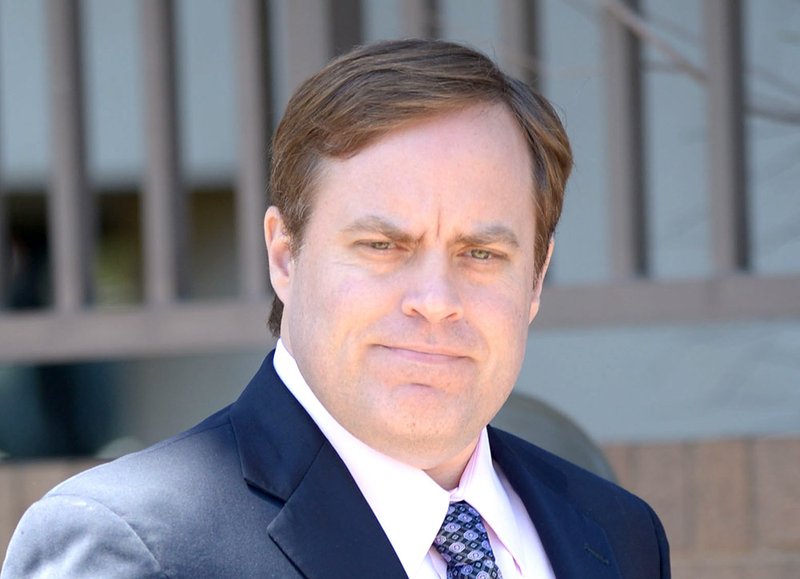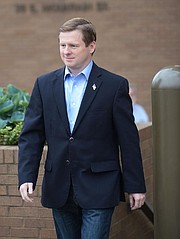FAYETTEVILLE -- A judge hearing the appeal of former state Sen. Jon Woods' corruption conviction wondered aloud Thursday how the court can weigh the value of evidence that doesn't exist.
Woods and co-defendant Randell Shelton Jr. are appealing their convictions in a kickback scheme involving state grants. Their appeal largely rests on a computer hard drive wiped of its contents by FBI Special Agent Robert Cessario.
The trial proceeded over defense objections despite proof Cessario had the hard drive in the FBI laptop professionally wiped after being ordered to turn the computer over for examination. Cessario was ordered to turn over the device after the defense showed in a pretrial hearing he didn't provide it with all the evidence on computer files requested.
The defense has to prove the information destroyed would have been useful to the defense under existing case law, the government argues.
Without the destroyed computer files the court has no way of knowing if the missing evidence would have helped the defense, Judge Jane Kelly said to federal attorney Sean F. Mulryne. "Here -- I don't think it's a pun -- it's a blank slate," Kelly said. "We just don't know what's there."
The appeal was heard Thursday morning before the 8th Circuit Court of Appeals in St. Louis in front of a three-judge panel. The court heard arguments, but didn't make an immediate ruling.
Woods' and Shelton's trial judge, U.S. District Judge Timothy Brooks, followed precedent by ruling the trial could proceed, Mulryne argued. Brooks was in the best position to judge the issue after extensive pretrial hearings, Mulryne said.
The defense does have proof the destroyed evidence would have benefited them -- Cessario's bad act itself, argued defense attorney Shelly Koehler of Fayetteville, who represents Shelton.
"The fact that something was destroyed in bad faith, it gives the inference that it was done to prejudice the defense," Koehler argued. "Otherwise, why destroy it?"
Woods' and Shelton's convictions involve kickbacks from state grants to Ecclesia College in Springdale. Shelton, of Kemp, Texas, was convicted of 12 fraud-related counts in the same trial as Woods, of Springdale. Woods also was convicted of one count of money laundering and two additional counts of fraud. The two were convicted by a jury in U.S. District Court in Fayetteville on May 3, 2018.
Woods and co-conspirator Micah Neal of Springdale, who was a state representative before pleading guilty in 2017, steered state grant money to Ecclesia College in 2013 and 2014. The college's president at the time, Oren Paris III of Springdale, pleaded guilty in the scheme to one conspiracy count for paying kickbacks on the grants. Paris paid the kickbacks by hiring Shelton as a consultant. Shelton passed a portion of those consulting fees along to Woods and Neal.
Neal, who cooperated with authorities early in the investigation, served a year of home detention for one count of conspiracy. Paris reserved his right to appeal on the basis of FBI misconduct. His appeal is also pending before the 8th Circuit, but is separate from Woods' and Shelton's.
Woods is serving an 18-year federal prison sentence. Shelton is serving a six-year sentence. Paris is serving three years.
Before Woods' and Shelton's trial, Cessario of Bentonville was ordered Nov. 30, 2017, to turn in a laptop computer he used in the case to a forensic examiner in Little Rock. The order came after defense attorneys discovered the agent didn't pass along all the electronic files requested by the defense. Specifically, Cessario didn't forward all the audio files Neal recorded in secret.
Cessario took the laptop to a computer shop in Bentonville and had its hard drive erased, according to court testimony by a technician at the computer shop and by Cessario. Then Cessario wiped the hard drive again himself before turning the device over Dec. 7, 2017, he said in court testimony.
The appeal also disputes jury instruction decisions and other rulings by Brooks.
The appeal asks for dismissal of the charges. If not, then a new trial should be ordered in which Cessario's conduct is allowed to be presented to the jury, acccording to the appeal. Brooks ruled the government couldn't call Cessario as a witness and neither could the defense.
Late in Thursday's proceedings, Kelly asked Mulryne why the government at trial opposed letting the jury know of Cessario's bad acts and letting it make its own decision regarding those facts. Mulryne replied Brooks gave the matter exhaustive consideration in pretrial hearings and the judge's decision was well-based in precedent and logic.
"The district court was in the best position whether this would devolve into a mini-trial" on Cessario, Mulryne argued. Woods and Shelton were on trial, not Cessario, he said.
Cessario is still suspended without pay pending resolution of an investigation into his conduct in the matter, Mulryne told the court.
NW News on 01/17/2020


